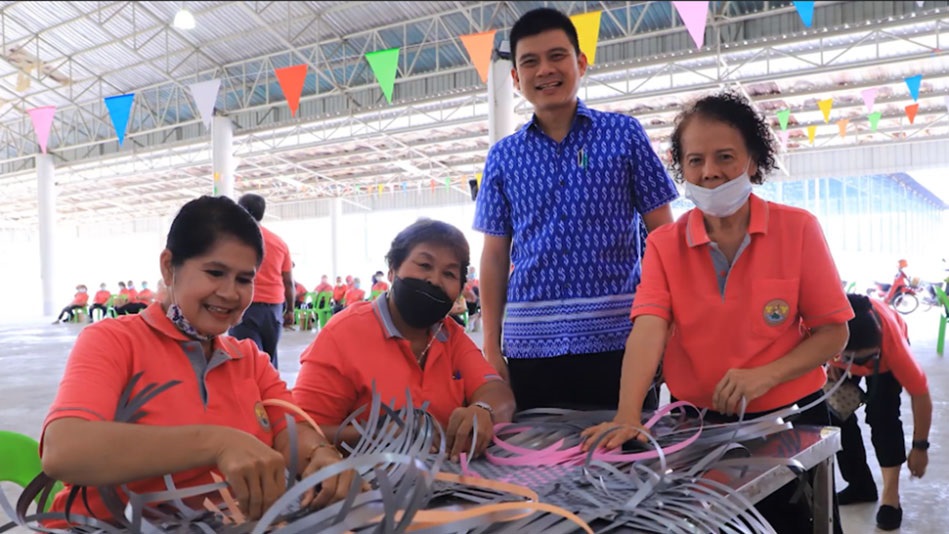/data-and-analytics-(dna)/data-exchange-(dex)/who-presence-in-countries--territories-and-areas.tmb-1920v.jpg?sfvrsn=f1146a2_2)
Transformative urban health governance in Thailand’s Healthy Cities
Stronger WHO country presence for a healthier and safer world
Joint Outcome 2.1.
Health inequities reduced by acting on social, economic, environmental and other determinants of health
Rapid urbanization has led to increased vulnerabilities in health risks, behaviours, health care access and overall well-being globally. In Thailand, where more than 50% of the population resides in cities, similar challenges persist, necessitating improved urban governance to create healthier environments and to ensure equitable access to health care. 1 In 2022, the World Health Organization (WHO) Regional Office for South-East Asia launched the Healthy Cities initiative, helping cities to address health determinants through cross-sectoral collaboration, capacity-building and evidence-based actions. 2By 2024, this initiative had led to the recognition of four Thai cities as WHO committed Healthy Cities for their transformative urban health initiatives, enhancing health equity and sustainability. These efforts underscore Thailand’s leadership in fostering healthier, more resilient urban environments
WHO’s leadership and tailored support
WHO Thailand’s advocacy and leadership played a critical role in encouraging Thai cities to participate in the Healthy Cities initiative. With technical support from WHO, several Thai cities prepared and submitted their applications for the first round of recognition through the WHO Regional Laboratory on Urban Governance for Health and Well-being. This included translation assistance, guidance on development of city plans, and documentation of initiatives and requirements for accreditation. Simultaneously, WHO partnered with the Ministry of Public Health to advance the Thailand Healthy City programme, which aims to promote and recognize 1000 healthy cities by 2027. WHO Thailand provided capacity-building activities such as urban leadership training and health impact assessment training for local authorities, in collaboration with the Regional Office.
/data-and-analytics-(dna)/data-exchange-(dex)/social-inclsion-thailand.tmb-1920v.jpg?sfvrsn=c94cf1cd_2)
Sanon Wangsrangboon, Deputy Governor of Bangkok, advocating for social inclusion and universal care through initiatives such as pride clinics for LGBTQ+ individuals and expanded childcare services.
In 2024, out of the 10 cities in the Region that were designated for the first time as WHO committed Healthy Cities, four cities in Thailand were recognized: the Bangkok Metropolitan Administration, the Sadao Municipality in Songkhla, the Ban-Suan Municipality in Chonburi, and the Klong Chaun Municipality in Surat Thani. These cities have implemented initiatives such as health care for vulnerable groups, accessible public transport, green spaces, promotion of health literacy, home visits, community engagement and sustainable local development.
WHO committed Healthy Cities in 2024
Each city implemented unique initiatives tailored to their local contexts.
Bangkok Metropolitan Administration Advanced the Healthy City plan with sports fields, health literacy initiatives and the 15-minute park policy to ensure access to green spaces, and applied “health in all city” programmes. Worked with the WHO headquarters Partnership for Healthy Cities on safe travel to strengthen the governor’s policies to improve walking and cycling ability, connecting public transport in Bangkok.
Ban-Suan Municipality, Chonburi Improved health care for vulnerable populations through home visit programmes, waste management and leadership development for community leaders.
Sadao Municipality, Songkhla Encouraged community participation through lifelong learning and leader training, addressed health determinants of vulnerable groups and introduced a health security fund.
Klong Chaun Municipality, Surat Thani Enhanced health security funds for long-term care, developed age-friendly facilities and promoted community initiatives such as elderly schools.
These initiatives led to measurable improvements, such as increased access to health care services, enhanced health literacy, expanded green spaces and strengthened community engagement. Despite the successes of the Healthy Cities initiative, several challenges emerged, underscoring the need for adaptability and strategic adjustments. Scaling up the number of Healthy Cities requires strong leadership and capacity at the local level to identify gaps and develop innovative solutions tailored to each city’s unique context. The recently established WHO Healthy City Network also calls for heightened awareness and advocacy to encourage broader participation among cities. Additionally, the complex requirements for accreditation and city planning highlighted the need for comprehensive support, including the translation of essential documents into Thai.

Skills training, career development and income-generating opportunities for communities in Sadao.
Sustainability efforts have been a cornerstone of this initiative, focusing on building local capacity and fostering long-term improvements. Community leaders and local public health authorities have played a critical role in accelerating programme implementation. Recognizing and empowering public health officers in well-performing cities has proven instrumental in sustaining momentum. Continued support from WHO, opportunities for cities to exchange lessons and best practices, and sustained government engagement are essential for equipping local authorities to independently promote health and well-being. These measures ensure that urban health governance in Thailand remains effective, resilient and capable of addressing future health challenges.
The recognition of four Thai cities as WHO committed Healthy Cities exemplifies the power of tailored urban health governance and cross-sectoral partnerships in improving health outcomes. These cities have not only enhanced access to health care and fostered community participation, but created scalable models for other urban centres facing similar health challenges. The success of these initiatives, underpinned by robust collaboration between WHO and Thailand’s Ministry of Public Health, offers a valuable blueprint for accelerating urban health transformation across South-East Asia and beyond. With continued innovation and local leadership, Thailand is well-positioned to expand this model for healthier, more equitable cities.
